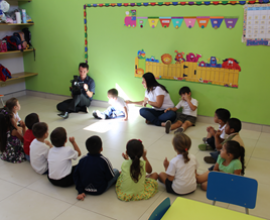Opportunities for mothers in Costa Rica
24/02/2015
PrintNational Network for Child Care and Development in Costa Rica (RedCUDI)
More than 32,000 children, mostly from poor, vulnerable families in high-risk situations are cared for by the National Network for Child Care and Development in Costa Rica (RedCUDI), which provides food services and educational stimulation. With this initiative, the government of Costa Rica, in addition to facilitating the inclusion of women in the labour market as well as preventing school dropouts, are recognising child care as a right of children, and therefore as a public service that the State should offer.
Thousands of female household heads have nowhere to leave their children and need to bring income home. As private childcare centres are very expensive, these mothers face the dilemma of staying at home caring for their children or going out to work, in many cases even to continue studying. The RedCUDI serves primarily children under seven years of age who receive early educational stimulation provided by preschool professionals and four mealtimes during a care shift of up to 10 hours (breakfast-snack-lunch-snack) . Marta Morales, caretaker at one of the centres of the network, tells of the impact this initiative has had: "There is a visible change and it is not only seen in the families, but also in the children. Many of them live recurrent cycles of violence ... also because of the frustration of their mothers who are unable to feed them and could not go to work. Children who came here with a very high level of aggressiveness are now less aggressive.”
EUROsociAL, the program of cooperation between the EU and Latin America, has provided key inputs for the implementation of RedCUDI. During the drafting of the law that enshrines this initiative, EUROsociAL facilitated visits and information so that Costa Rican institutions knew firsthand how various models of public action work in different European countries. As noted by the National Director of RedCUDI "the contact we had with Germany, France, Italy, and even Finland was very important... Finland is a benchmark of best practice care during early childhood".
With RedCUDI, Costa Rica has managed to comprehensively articulate a set of fragmented, dispersed and targeted social policies that sought to provide answers to vulnerable and at risk populations, including children. This is a good example of coordination and articulation to respond to an aggravated social problem. The Network brings together all forms of care (formal or not) under one umbrella to provide services. It also combines public and private care, as the network includes universities, foundations, NGOs, charities and businesses.
Costa Rica's example demonstrates how to implement care services that promote growth and inclusion, particularly of women, thus advancing social cohesion.

